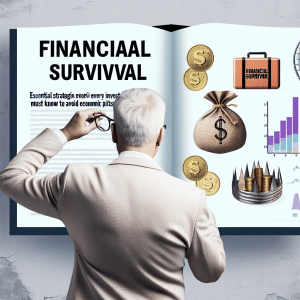Avoiding financial disaster isn’t just a personal goal—it’s a necessity in today’s volatile economic landscape. Since the Great Depression, Americans have grappled with recessions, market crashes, and housing bubbles. Now, more than ever, safeguarding your financial future demands a strategic, informed approach rather than hopeful wishful thinking.
Robert Kiyosaki, renowned author of “Rich Dad Poor Dad,” offers timeless wisdom that remains profoundly relevant for investors navigating today’s uncertain markets. But at Extreme Investor Network, we go beyond the basics to unpack what his advice means in the current economic context—and how you can apply it to stay ahead.
1. Financial Literacy: Your First Line of Defense
Kiyosaki champions financial education as the foundation of security. Understanding the mechanics of money—knowing the difference between assets and liabilities, grasping investment basics, and decoding financial institutions—is non-negotiable.
Why this matters now: According to a 2023 FINRA Investor Education Foundation report, only 34% of Americans demonstrate basic financial literacy. This gap leaves the majority vulnerable to poor financial decisions, especially with rising interest rates and inflation pressures. Investors who invest time in education can spot opportunities others miss, such as undervalued stocks or emerging real estate markets.
Actionable insight: Start with niche learning. For example, dive deep into real estate trends in your local market. Understanding how subprime mortgages contributed to the 2008 crisis can help you avoid similar pitfalls today. Real estate platforms like Fundrise or Roofstock offer accessible entry points to learn while investing.
2. Build Multiple Passive Income Streams
Kiyosaki’s emphasis on passive income is more than just theory—it’s a survival strategy. Rental income, dividends, royalties, or automated online businesses generate cash flow without constant effort, enabling wealth accumulation beyond a 9-to-5 paycheck.
Unique perspective: In 2024, the rise of AI and automation is creating new passive income avenues, such as AI-driven content creation and automated investing platforms. Investors should explore these emerging opportunities to diversify income sources.
What investors should do: Identify at least two passive income streams outside your primary job. For instance, pairing dividend stocks with a small rental property can provide stability and growth. Consider platforms like Betterment for automated investing or Etsy for digital product sales.
3. Live Below Your Means—But Strategically
Living frugally isn’t about deprivation; it’s about prioritizing financial resilience. Kiyosaki warns against lifestyle inflation—spending more as you earn more—which erodes your savings buffer.
Current trend: In 2024, consumer debt levels have surged, with the Federal Reserve reporting U.S. household debt hitting $17 trillion. This makes Kiyosaki’s advice critical: avoid unnecessary debt and build a cash cushion.
Investor advice: Use budgeting apps like YNAB (You Need A Budget) or Mint to track spending and identify areas to cut back. Redirect those savings into high-yield savings accounts or investment vehicles.
4. Focus on Assets, Not Liabilities
Kiyosaki’s simple definition of assets versus liabilities is a game-changer: assets put money in your pocket; liabilities take money out. Prioritizing asset acquisition—real estate, stocks, bonds—over liabilities like luxury cars or high-interest credit cards can transform your financial trajectory.
Insight: In 2024, ESG (Environmental, Social, Governance) investing is gaining traction as a way to acquire assets with long-term growth potential while aligning with ethical values. Consider integrating ESG funds into your portfolio for sustainable wealth growth.
5. Adapt and Review Your Financial Plan Regularly
Your financial plan should be as dynamic as your life. Kiyosaki stresses revisiting your budget and investments in response to job changes, market shifts, or economic trends.
New data: A survey by Charles Schwab in 2024 found that investors who review their portfolios quarterly outperform those who don’t by 15% annually.
Action step: Set quarterly financial check-ins. Use this time to rebalance your portfolio, adjust savings goals, and stay informed about market conditions. Financial advisors can provide tailored advice to keep your plan aligned with your goals.
6. Overcome Fear with Informed Risk-Taking
Fear of losing money often paralyzes investors, but Kiyosaki encourages embracing failure as a learning tool. The key is informed risk-taking—balancing potential rewards with calculated risks.
Expert insight: According to a 2024 report by Morningstar, investors who adopt a growth mindset and tolerate short-term volatility tend to achieve better long-term returns.
What’s next: Cultivate resilience by educating yourself continuously and diversifying your portfolio to mitigate risks. Consider starting small with new investments to build confidence.
What Should Investors Do Differently Now?
- Prioritize financial education: Use online courses, podcasts, and books to deepen your understanding of current market dynamics.
- Diversify passive income: Explore innovative income streams powered by technology.
- Control lifestyle inflation: Automate savings and investments to build wealth effortlessly.
- Integrate ESG investing: Align your portfolio with future-proof sectors.
- Regular portfolio reviews: Make adjustments quarterly to stay on track.
- Embrace calculated risks: Use data-driven strategies to overcome fear and capitalize on opportunities.
In a world where economic shocks can come unexpectedly, Kiyosaki’s principles—when combined with modern tools and insights—offer a robust blueprint for financial resilience. At Extreme Investor Network, we believe that mastering these strategies today is the best hedge against tomorrow’s uncertainties.
References:
- FINRA Investor Education Foundation, 2023 Financial Literacy Study
- Federal Reserve, Household Debt Report, 2024
- Charles Schwab, Investor Behavior Survey, 2024
- Morningstar, Investment Mindset Report, 2024
By adopting these forward-looking strategies, you’re not just avoiding financial disaster—you’re positioning yourself to thrive in any economic climate.
Source: 5 Tips From Robert Kiyosaki To Save You From Financial Disaster

